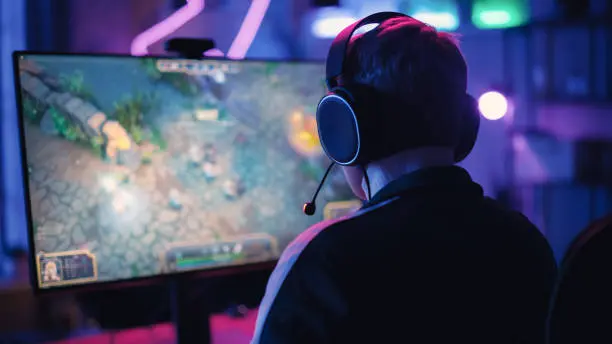
Game Career Development: Building a Successful Career in the Gaming Industry
- Admin
The gaming industry is one of the fastest-growing sectors, offering diverse opportunities for individuals with various skills and passions. Whether you’re interested in game design, programming, animation, or esports management, building a successful career in gaming requires a combination of creativity, technical know-how, and a deep understanding of the industry’s evolving trends.
This guide will walk you through the steps to develop a career in gaming, explore the skills needed for different roles, and provide tips for breaking into this exciting and competitive field.
1. Understanding the Gaming Industry
The gaming industry is vast, encompassing many different career paths. Here are some of the most prominent areas:
Game Development: This includes roles like game designers, developers, and artists. These professionals work on the creation and production of video games, from concept to completion.
Programming and Coding: Game programmers write the code that makes games function. This is a highly technical role, requiring proficiency in languages like C++, Python, and Unity.
Game Design and Art: Game designers develop the mechanics, rules, and storyline, while artists create the visual elements, such as characters, environments, and animations.
Quality Assurance (QA): Game testers ensure that games are free of bugs and perform well before release.
Esports and Competitive Gaming: Esports offers roles such as players, coaches, event organizers, and managers. This segment has grown rapidly and involves high-level competitive play.
Game Marketing and Business Development: These professionals focus on promoting games, managing business relationships, and ensuring that games reach their target audience.
2. Educational Pathways and Skills Development
While some people in the gaming industry are self-taught, many positions require a formal education or specialized training. Depending on the career path you choose, there are various ways to gain the skills needed:
Game Design Programs: Many universities offer degrees in game design, digital media, or interactive entertainment. These programs teach essential skills like level design, 3D modeling, and storytelling.
Programming Courses: For those interested in game development or coding, a degree in computer science or software engineering can be beneficial. Additionally, online platforms like Udemy, Coursera, and edX offer game development courses.
Art and Animation Schools: For careers in game art and animation, degrees in fine arts, graphic design, or animation are common pathways. Courses in 3D modeling, concept art, and visual storytelling are essential.
Certifications and Bootcamps: Specialized certifications in game development tools like Unity, Unreal Engine, or Blender can also boost your employability.
3. Building a Portfolio
A strong portfolio is critical for landing a job in the gaming industry. Whether you’re an artist, programmer, or designer, employers want to see a tangible demonstration of your skills. Here are tips for creating a standout portfolio:
Showcase Completed Projects: Include fully finished games or projects, even if they’re small. Potential employers want to see that you can take a project from concept to completion.
Highlight Your Role: Clearly outline what part you played in each project. If you worked as a team, specify whether you were responsible for coding, character design, or gameplay mechanics.
Diverse Work: Show a range of skills, such as 2D/3D art, animation, different programming languages, or various game genres.
Use GitHub or ArtStation: Programmers can showcase their code and projects on GitHub, while artists can use platforms like ArtStation or Behance to display their visual work.
4. Networking and Industry Connections
Building a network within the gaming industry is essential for career growth. Here are ways to connect with professionals and gain visibility:
Join Online Communities: Platforms like Reddit, Discord, and LinkedIn have active gaming and game development communities where professionals exchange knowledge, seek collaborators, and share job opportunities.
Attend Industry Events: Conferences like GDC (Game Developers Conference), E3, and PAX provide excellent opportunities to network, learn from industry leaders, and showcase your work.
Internships and Entry-Level Roles: Internships are a great way to get your foot in the door. Many game companies offer internships or junior roles that can lead to full-time positions.
5. Staying Up-to-Date with Industry Trends
The gaming industry is continuously evolving, and staying current with new trends is crucial for long-term success. Some of the emerging trends include:
Virtual Reality (VR) and Augmented Reality (AR): VR and AR technologies are becoming more popular in gaming. Understanding these platforms and how to develop for them can give you an edge.
Esports Growth: The rise of competitive gaming has created new job opportunities in tournament organization, broadcasting, and coaching. If you’re passionate about gaming competitions, this is an exciting field to explore.
Indie Game Development: Independent game developers have more tools at their disposal than ever before. Platforms like Steam, Epic Games Store, and Itch.io have made it easier for indie developers to release and monetize their games.
Blockchain and NFT Gaming: Blockchain technology and non-fungible tokens (NFTs) are starting to impact the gaming world, allowing players to own and trade in-game assets.
6. Career Advancement in the Gaming Industry
Once you’ve established yourself in the gaming industry, there are several ways to advance your career:
Specialize in a Niche Area: As you gain experience, consider specializing in a particular area, such as AI development, level design, or VR gaming. Expertise in a niche can make you a sought-after talent.
Leadership Roles: With experience, you can move into leadership roles, such as lead game designer, art director, or project manager. These positions oversee teams and the overall development process.
Freelancing or Indie Development: Many professionals in the gaming industry branch out into freelance work or start their own independent game studios. This path allows for creative freedom and the potential for financial success.
Conclusion
A career in the gaming industry can be incredibly rewarding, offering opportunities to work on exciting projects and be part of a dynamic, evolving field. By developing the right skills, building a strong portfolio, and networking with industry professionals, you can set yourself up for success. Whether you’re interested in game design, programming, esports, or business development, the gaming industry has a place for you.
